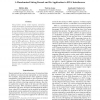Free Online Productivity Tools
i2Speak
i2Symbol
i2OCR
iTex2Img
iWeb2Print
iWeb2Shot
i2Type
iPdf2Split
iPdf2Merge
i2Bopomofo
i2Arabic
i2Style
i2Image
i2PDF
iLatex2Rtf
Sci2ools
116
click to vote
AAAI
2007
2007
A Randomized String Kernel and Its Application to RNA Interference
String kernels directly model sequence similarities without the necessity of extracting numerical features in a vector space. Since they better capture complex traits in the sequences, string kernels often achieve better prediction performance. RNA interference is an important biological mechanism with many therapeutical applications, where strings can be used to represent target messenger RNAs and initiating short RNAs and string kernels can be applied for learning and prediction. However, existing string kernels are not particularly developed for RNA applications. Moreover, most existing string kernels are n-gram based and suffer from high dimensionality and inability of preserving subsequence orderings. We propose a randomized string kernel for use with support vector regression with a purpose of better predicting silencing efficacy scores for the candidate sequences and eventually improving the efficiency of biological experiments. We show the positive definiteness of this kern...
AAAI 2007 | Better Capture Complex | Intelligent Agents | Randomized String Kernel | String Kernels |
| Added | 02 Oct 2010 |
| Updated | 02 Oct 2010 |
| Type | Conference |
| Year | 2007 |
| Where | AAAI |
| Authors | Shibin Qiu, Terran Lane, Ljubomir J. Buturovic |
Comments (0)

